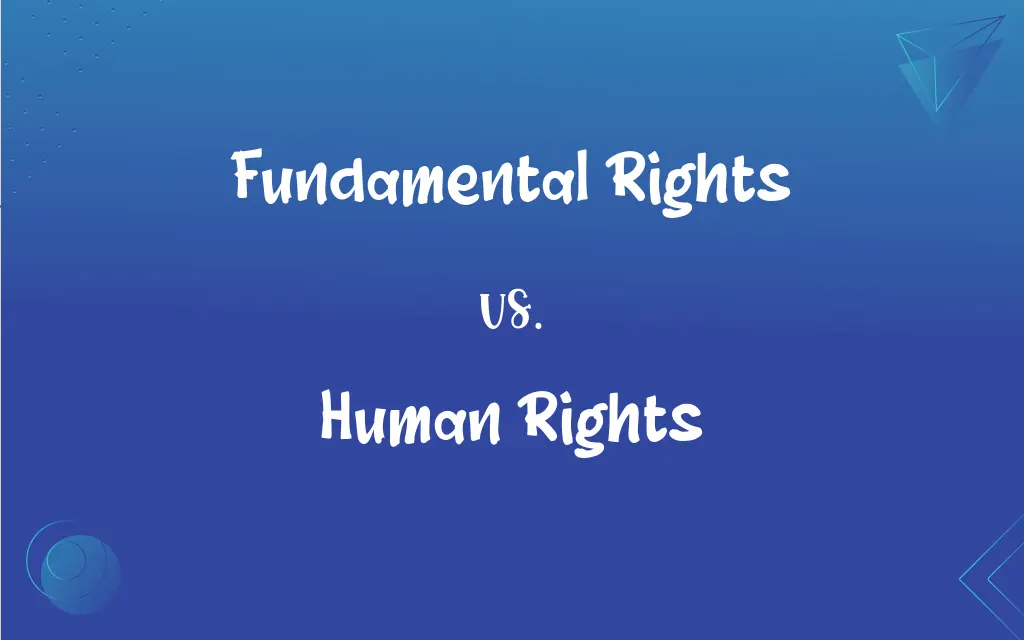Fundamental Rights vs. Human Rights: What's the Difference?
Edited by Janet White || By Harlon Moss || Updated on October 21, 2023
Fundamental rights are constitutionally protected rights in a nation, while human rights are universally recognized rights for all individuals.

Key Differences
Fundamental rights are rights that are enshrined in a nation's constitution, granting protections and entitlements to its citizens. Human rights, on the other hand, are universal rights recognized as inherent to every individual, regardless of nationality, place of residence, or any other distinction. Both fundamental rights and human rights aim to protect the dignity, freedom, and equality of individuals, but their source and scope differ.
Both fundamental rights and human rights serve as benchmarks against which the actions of governments and organizations can be measured. However, while fundamental rights are typically enforceable within a specific country and can be subject to its unique legal interpretations, human rights transcend borders and are applicable globally. The Universal Declaration of Human Rights is an example of an international document that outlines human rights, whereas fundamental rights would be found in individual national constitutions.
It is essential to note that while all human rights are universally applicable, not all of them may be recognized as fundamental rights within a particular country. This means a nation's constitution might not guarantee certain human rights, making it a topic of contention and advocacy. Conversely, some fundamental rights might be very specific to a nation's historical or cultural context and might not be regarded as universal human rights.
In essence, fundamental rights are rooted in a nation's legal and constitutional framework, specifically tailored to its socio-cultural and political needs. In contrast, human rights are broader, overarching rights that every individual should enjoy merely by virtue of being human, irrespective of their nationality or origin.
Comparison Chart
Source
National constitutions
International agreements & inherent human dignity
ADVERTISEMENT
Scope
Specific to a country
Universal, irrespective of nationality
Enforceability
Within a specific nation
Globally, through international courts & bodies
Examples of Documents
US Constitution, Indian Constitution
Universal Declaration of Human Rights
Can be subject to
Amendments and national legal interpretations
Universal principles, with interpretations by global bodies
Fundamental Rights and Human Rights Definitions
Fundamental Rights
Specific rights enshrined in a national context.
The right to vote in national elections is a fundamental right for citizens.
ADVERTISEMENT
Human Rights
Rights that transcend national boundaries.
Every individual, regardless of their background, has the human right to education.
Fundamental Rights
Legally protected rights within a country.
The right to a fair trial is a fundamental right in many democracies.
Human Rights
Principles based on inherent human dignity.
The right to life is a foundational human right that must be respected.
Fundamental Rights
Rights guaranteed by a nation's constitution.
In the US, the First Amendment guarantees the fundamental right to freedom of speech.
Human Rights
Universal rights inherent to all individuals.
Freedom from torture is a basic human right recognized worldwide.
Fundamental Rights
Constitutional safeguards for citizens.
Protection against unlawful detention is a fundamental right in democratic societies.
Human Rights
Broad rights applicable to all humans.
Freedom of thought and conscience is a universal human right cherished globally.
Fundamental Rights
Rights that can be legally enforced within a country.
Equal protection under the law is a fundamental right that ensures justice.
Human Rights
Rights recognized and upheld by international bodies.
The right to seek asylum from persecution is a recognized human right.
FAQs
What are fundamental rights?
Fundamental rights are rights protected by a nation's constitution.
How do human rights differ?
Human rights are universal rights inherent to all individuals, regardless of nationality.
Are fundamental rights the same in every country?
No, fundamental rights vary based on a country's constitution and legal framework.
Can a fundamental right be amended?
Yes, in most countries, fundamental rights can be amended through constitutional processes.
Are all human rights listed in national constitutions?
No, while many human rights are mirrored in national constitutions, not all are guaranteed as fundamental rights.
Is the right to privacy a human right?
Yes, the right to privacy is recognized as a universal human right.
Can a country opt-out of recognizing certain human rights?
A country might not include certain human rights in its legal framework, but this can lead to international criticism.
Are rights like healthcare and education considered fundamental or human rights?
They are recognized as human rights globally, but whether they are fundamental rights depends on a nation's constitution.
How do activists promote human rights?
Through advocacy, awareness campaigns, legal action, and international lobbying.
Can governments restrict fundamental rights?
Some fundamental rights can be limited under specific conditions, usually for reasons like national security.
Can international bodies enforce human rights within a country?
While they can't directly enforce, they can apply diplomatic pressure, sanctions, or take legal actions.
Are children's rights considered human rights?
Yes, children have specific rights recognized under international human rights law.
Who enforces human rights?
International bodies, like the United Nations, promote and oversee the observance of human rights.
Where can I find a list of universal human rights?
The Universal Declaration of Human Rights provides a comprehensive list of human rights.
Why are fundamental rights important?
Fundamental rights protect citizens from government overreach and ensure personal freedoms.
Are there cultural differences in interpreting human rights?
Yes, while human rights are universal, cultural contexts might influence interpretations.
Can a person be denied fundamental rights?
In some situations, such as a declared state of emergency, certain fundamental rights might be temporarily restricted.
Who drafts a country's fundamental rights?
They're usually drafted by constitutional framers or representatives and then ratified.
Why is it crucial to distinguish between fundamental and human rights?
Understanding the distinction helps in identifying rights protected nationally versus those recognized universally.
Are there organizations dedicated to protecting human rights?
Yes, organizations like Amnesty International and Human Rights Watch work to protect human rights globally.
About Author
Written by
Harlon MossHarlon is a seasoned quality moderator and accomplished content writer for Difference Wiki. An alumnus of the prestigious University of California, he earned his degree in Computer Science. Leveraging his academic background, Harlon brings a meticulous and informed perspective to his work, ensuring content accuracy and excellence.
Edited by
Janet WhiteJanet White has been an esteemed writer and blogger for Difference Wiki. Holding a Master's degree in Science and Medical Journalism from the prestigious Boston University, she has consistently demonstrated her expertise and passion for her field. When she's not immersed in her work, Janet relishes her time exercising, delving into a good book, and cherishing moments with friends and family.































































